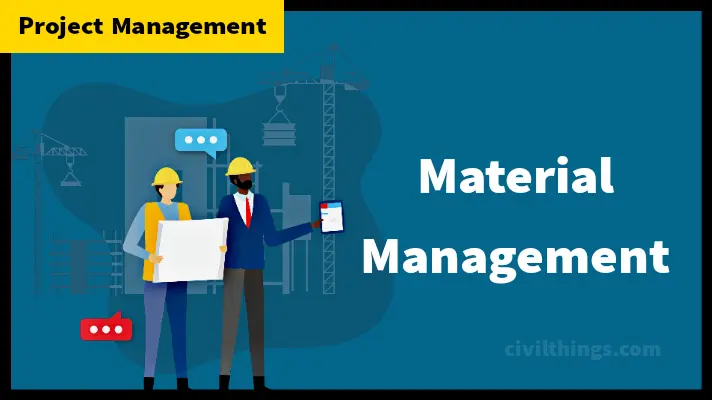Table of Contents
Importance of Material Management

Material management is a crucial aspect of construction projects, encompassing all activities related to materials from inception to delivery on-site. It constitutes a significant portion of project costs, ranging from 40% to 60%. Efficient material management is key for optimizing project timelines, costs, and quality.
Why Material Management is Essential
Effective material management ensures:
- Cost Savings: Proper planning and timely availability of materials lead to cost efficiency.
- Time Management: Scheduled procurement and delivery prevent project delays.
- Quality Improvement: Ensuring the right materials in correct quantities enhances construction quality.
Key Functions of Material Management
Material management involves:
- Scientific procurement planning
- Determining what, when, and how much to purchase
- Identifying reliable suppliers
- Efficient storage and distribution
- Monitoring market conditions for cost-effective purchases
Objectives of Material Management
The objectives of material management can be categorized into primary and secondary objectives.
Primary Objectives
- Efficient Materials Planning: Strategically plan material needs throughout the project lifecycle.
- Buying or Purchasing: Source high-quality materials from trusted suppliers.
- Procuring and Receiving: Ensure timely receipt and inspection of materials.
- Storing and Inventory Control: Optimize storage to minimize wastage and damage.
- Supply and Distribution of Materials: Facilitate smooth material flow within the project.
- Quality Assurance: Maintain standards through inspections and tests.
- Good Supplier and Customer Relationship: Foster strong partnerships for reliable supply chains.
- Improved Departmental Efficiency: Enhance overall project efficiency through streamlined material processes.
Secondary Objectives
- Efficient Production Scheduling: Align material availability with production schedules.
- To Take, Make or Buy Decisions: Strategically decide whether to produce or purchase materials.
- Prepare Specifications and Standardization of Materials: Establish quality norms and standards.
- To Assist in Product Design and Development: Contribute to product enhancement through material insights.
- Forecasting Demand and Quantity of Materials: Predict future needs for effective inventory management.
- Quality Control of Materials Purchased: Ensure consistency in material quality.
- Material Handling: Implement safe and efficient material handling practices.
- Use of Value Analysis and Value Engineering: Optimize material value through analysis.
- Developing Skills of Workers in Materials Management: Train and empower staff for efficient operations.
- Smooth Flow of Materials in and out of the Organization: Minimize bottlenecks in material flow for project continuity.
Objectives of Material Management
Consistency of quality
Steady flow of material
Speedy disposal of surplus material
Improving competitive strength
Elimination/minimisation of wastage of materials
Economy in cost of material
Lower inventory investment
Preservation/conservation of material
Improved corporate image through good buyer-seller relationships
Good record
Must Check ✅✅✅
List of URLs with Alt Text
- Project Management in Civil Engineering
- Project Life Cycle Guide
- Construction Quotation Template
- Epoxy Flooring Paint
- Best Measuring Tapes Collection
- Construction Insurance Companies
- Landfill and Solid Waste Management
- SSC Junior Engineers Recruitment 2024
- Compound Wall Design Ideas
- Source of Water Types and Differences
- Town and Country Planning Notes
- Modern Road Barriers
- Modern Parapet Wall Design Ideas
- Single Floor House Design
- Anti-Termite Treatment Guide
- Free Building Estimation Excel Sheet
- E-Tender CPWD Guide
- Kitchen Tiles Design
- Campus Placement for Civil Engineering Students
- Water Cement Ratio Calculation
- PVC Ceiling Design Ideas
- Types of Glass in Construction
- DLC in Road Construction
- BRO – Border Roads Organization
- PWD – Public Works Department
- Construction Safety Equipment
- Exterior Door – Outswing Doors
- Structural Audit Stages
- Toilet Parts and Working
- Types of Admixtures in Concrete
Top 3 Post

Hi! I’m Sandip, a civil engineer who loves sharing about Civil Engineering & new ideas and tips. My blog helps you learn about engineering in a fun and easy way!



